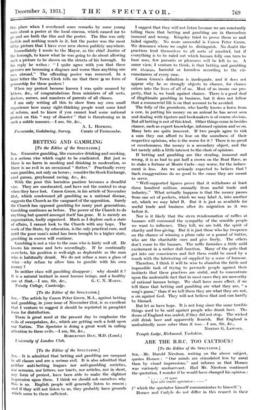[To the Editor of the SPECTATOR.] a,—It is admitted that
betting and gambling are rampant in all classes and are a serious evil. It is also admitted that neither anti-betting leagues nor anti-gambling societies, nor sermdns, nor letters, nor tracts, nor articles, nor in short, any forni of protest, have been able to make the slightest impression upon them. I think we should ask ourselves why this is so. English people will generally listen to reason ; and if they will not listen to us, they probably have' grounds which seem 'to them sufficient. I suggest that they will not listen because we are constantly telling them that betting and gambling are in themselves immoral and wrong. Kingsley tried to prove them so and failed signally. No more successful is Canon Peter Green. We denounce where we ought to distingutsh. No doubt the practices lend themselves to all sorts of mischief, but if everything is to be ruled out which human folly can turn to base uses, few pursuits or pleasures will be left to us. A saner view, I venture to think, is that betting and gambling are aduigbopa, harmful or harmless according to the cir- cumstances of every case.
Canon Green's definition is inadequate, and it does not appear why he so strongly objects to chance, for chance enters into the lives of all of us. Most of us insure our pro- perty, that is, we bank against chance. There is a good deal of illegitimate gambling in business, but it does not follow that a commercial life is on that account to be avoided.
The folly of the greenhorn, who hardly knows a horse from a cow, in putting his money on an animal he has never seen and dealing with tipsters and bookmakers is of course obvious. But all betting is not of this kind. Other things come in besides chance, such as expert knowledge, informed opinion and so on. Many bets are quite innocent. If two people agree to risk a sum they can afford to lose on the soundness of their respective opinions, who is the worse for it ? There is no greed or covetousness, the money is a secondary object, and the bet merely adds a little interest to the clash of opinions.
If betting and gambling are like stealing, immoral and wrong, it is as bad to put half a crown on the Boat Race, as to stake a fortune at Monte Carlo—nay worse, for the induce- ment is less. Are we seriously expected to believe that Y Such exaggerations do no good to the cause they are meant to serve.
" Well-supported figures prove that it withdraws at least three hundred millions annually from useful trade and industry." What actually happens is that the money passes from one set of pockets, which we may label A, into another set, which we may label B. But it is just as available for useful trade and business after its migration as it was before it.
Nor is it likely that the stern condemnation of raffles at bazaars will command the sympathy of the sensible people we want to influence. They kill, we are told, the spirit of charity and free-giving. But it is just those who lay twopence on the chance of winning a plum cake or a pound of butter, who are the charitable ones and give freely. The others don't come to the bazaars. The raffle furnishes a little mild excitement in a rather dull function. Many of the grits that get into our consciences and fret them could be cased by a touch with the lubricating oil supplied by a sense of humour.
Therefore, I think it will be wise to abandon the futile and impossible task of trying to persuade people against their instincts that these practices are sinful, and to concentrate upon the undeniable fact that in most cases they are unworthy of rational human beings. We shall have more effect, if we tell them that betting and gambling are what they are, " a mug's game," than if we tell them they are what they are not, a sin against God. They will not believe that and can hardly be blamed.
But let us have hope. It is not long since the same terrible things used to be said against people who drank beer. The doom of England was sealed, if they did not stop. The wicked still drink beer and apparently flourish. But England is undoubtedly more sober than it was.—I am, Sir, &c.,










































 Previous page
Previous page